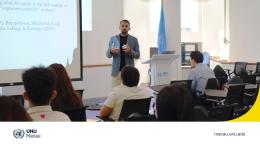While global efforts to regulate social media companies have increased in recent years, these initiatives primarily focus on privacy protection rather than addressing disinformation and misinformation. The connection between social media and political violence has been well-documented, most notably in Myanmar where Facebook was condemned by the United Nations for its role in spreading hate speech against the Rohingya population. Although various AI regulatory frameworks are emerging - such as the EU's "human-centred" guidelines, draft AI act and UNESCO's recommendations on AI ethics - these initiatives generally lack a holistic view of how artificial intelligence impacts political violence.
This research project addressed this knowledge gap by investigating how AI-driven technologies influence conflict dynamics, particularly through disinformation on social media platforms in Sub-Saharan Africa. The initiative represented Phase 1 of a feasibility study conducted jointly by Interpeace and UNU-CPR, focusing on drafting conflict-sensitive AI policies in Ivory Coast, Kenya, and the Democratic Republic of Congo.
Working collaboratively with researchers in these three focus countries, the project has uncovered valuable insights about the effects of AI-facilitated disinformation on conflict dynamics and supported the development of practical solutions. The recently published report highlights the urgent need for AI governance and regulation, documenting both how AI technologies can amplify disinformation and how they might be safely and effectively deployed to combat misinformation and promote peacebuilding.
By inspecting both the risks and opportunities presented by AI technologies in conflict settings, this research intends to inform more effective approaches to technology governance in fragile contexts and contribute to peacebuilding efforts across the region. The findings will help bridge the current gap between technological innovation and conflict prevention strategies, ultimately supporting more stable democratic processes in regions vulnerable to electoral violence.
- Project team
- Eduardo Albrecht


